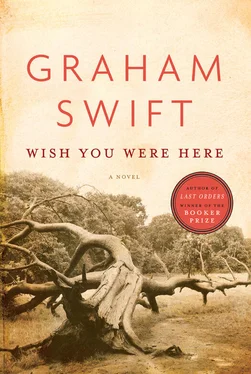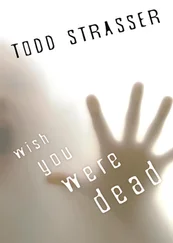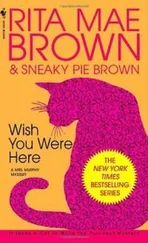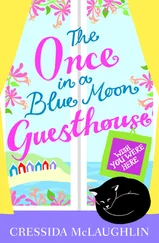The ferry throbbed out into the gleaming water, keeping close for a while to the wooded shore and passing near the other ferry point at Ryde, then heading into the open channel known as Spithead. Other ferries and a few merchant ships moved in various directions, smaller craft scattered among them. There was the feeling of some haphazard relay race. Against the dazzling light to the east appeared the silhouettes of squat island-forts.
The shoreline on the far side remained for a time one indistinct, built-up mass, punctured by the white thorn of the Spinnaker Tower. Then Portsmouth gradually separated itself from Gosport, and Southsea, with its beach front, from Portsmouth. Individual blocks of buildings flashed and glinted.
The ferry swung hard to make its entrance. Beyond the ramparts of the narrow harbour mouth could be seen, as if trapped among streets, the masts of the old ships, the Warrior and the Victory , and beyond them, at the water’s edge, the sharp bows of a berthed naval vessel, its grey hull and turrets bleached almost white, with an apricot blush, by the low sun.
Jack had slipped something else into his pocket before departing: his passport. Major Richards had told him he would need it, for identification, on his arrival at the airbase, along with other documents that would be sent to him. His passport showed a mugshot face not unlike that face with the beret and camouflage shirt in the newspaper photo.
Jack knew well enough that he wouldn’t need his passport in order to disembark from an Isle of Wight ferry in Portsmouth, but he felt as if he might. He felt, in fact, as the ferry slid through the jaws of the harbour, like a man who, even with his passport on him, not to mention a distinguished-conduct medal against his breast, would, as he came ashore, immediately be arrested.
IT WASN’T THE cow disease that had swung it for Tom. For Tom the trigger had been Luke. In more senses than one.
Michael pulled Tom out of school when he turned sixteen, to be a prisoner with his brother on Jebb Farm. No more making hay with schoolgirls. He might have made his escape — by the same route he eventually took — even then. But he waited till his father wouldn’t have the power to haul him back, till he was his own free man. And perhaps, even with Vera gone and life at Jebb like a lost cause, it was still not yet a clear thing. He bided his time. Sixteen to eighteen. In between, there’d been an ongoing cattle disease, but also there’d been Luke.
A sort of sliding scale: that sloping line between them. As Tom got bigger, the way it was between Tom and Luke became like the way it once had been between Jack and Tom. When Tom left school to take up full-time attendance at Jebb Farm, Luke somehow became Tom’s dog.
And Jack hadn’t minded even that. Luke had been the farm dog, the family dog (and he’d been around almost as long as Tom), but he’d been, especially, Jack’s. Sitting there in the back of the pick-up, ears flapping, as they’d bumped over to Ellie’s. But then he’d become Tom’s. It was Luke’s own choice and doing, and who could have said exactly when, or why, the crossover occurred? But it was how it was. Maybe it was that Tom had that bit of a mum about him, so Luke hung around Tom because Luke too missed Vera. Or maybe it was that Luke had worked out, just as Jack had, that Tom, though he was the younger brother, was simply superior at most things, including — and one of Luke’s functions was to be a gun dog — being a better shot.
But then Luke had got sick. He wasn’t young any more. This was some while after the cow disease first struck, but you might have said that Luke, though he’d taken his time, had only come up with his own disease in sympathy. He got sick anyway, just slow and sluggish sick, not mad sick, but he steadily got worse and, on top of it, he seemed to be going blind. They didn’t know what to do except hope the thing would solve itself, or that he wouldn’t linger, Luke would just spare himself and die. They were all thinking still, of course, of the last time, not so long ago, when there’d been a death pending in the house.
But it had just dragged itself out. Luke dragged himself out. It got a bit too much to take.
One heavy, sullen August morning Michael drove the pick-up into the yard, fetched a spade from the lean- to and put it in the back, then went into the house, unlocked the gun cabinet between the kitchen and the stairs and carried the shotgun out to the pick-up too. Jack and Tom were both in the yard at the time, but felt from the way their father was looking and moving that they shouldn’t speak. Then Michael went into the kitchen where Luke was by now confined to his blanket in a corner — beyond even padding his way to the door — and lifted him up and carried him out and put him in the back of the pick-up along with the spade.
He hadn’t said a word, but now he stared at Jack and Tom in a pausing-for-breath way, as if he might have had a statement prepared. But what came out was: ‘No, neither of you’s coming with me.’ Both brothers were looking hard at their father and both had perhaps stepped forward, perhaps more to restrain him than to join him, but this is how Michael chose to interpret the situation. Then something in Tom’s eyes, or something in his own thoughts, must have made Michael change his mind, because before he got back behind the wheel he said to Tom, and not to Jack, ‘Okay, if you must. Fetch another spade.’
Maybe that was all it was. He was thinking it would be quicker work, and not so much that by then Luke had become Tom’s dog. But if so, he might just as well have picked Jack or told them both to go and grab spades.
And then Michael, with Tom and Luke and the shotgun and two spades, had driven off.
Later, though not all at once, Tom told Jack everything — or everything that he wanted to tell him — but the scene itself, from which Jack was excluded, has only ever, like some other scenes from which he was absent yet which were crucial to his life, played itself out in his imagination, seeming each time to be both real and unreal.
But there’s no doubt that he heard the shot. His ears had been straining for it. And, later on, he saw the little mound of freshly patted-down earth. Luke had been too weak to raise his head above the side of the pick-up as it drove away, so that he and Jack could take a last look at each other, and Jack realised when it was too late that he hadn’t even been allowed the chance to say goodbye to him or give him a final stroke. His father had driven off fast, over-revving the engine, as if there were no time to lose or as if he were afraid of changing his mind.
Then Jack was alone in the deserted yard, with the receding sound of the pick-up jolting its way down the hill. In the muggy air, a hatch of flying ants was buzzing round him. His mother, he knew, would have found where the nest was, then boiled the kettle. But Jack just stood, listening, in the yard.
Tom said they’d driven down Barton Field, his father stamping on the brake, past the big oak, to the low, flat corner by the wood where the ground, even in summer, was nearly always soft. Then they’d stopped and Dad had gone round to gather up Luke, who must by then have formed his own conclusions. Tom didn’t say if anything had been spoken on the way down or if, at this point, there’d been any argument. You don’t have a tug-of-war with a sick animal. Dad had carried Luke a few yards from the pick-up and put him on the grass. Then he’d gone back for the gun. Tom said he hadn’t wanted to touch it himself, he hadn’t made any move in that direction.
Dad had the cartridges in his pocket and while he stood and loaded the gun — both barrels, just in case — he told Tom to get the two spades from the back. Jack asked Tom how their father had spoken, and Tom had thought for a bit and said he’d spoken like he was giving orders. This wasn’t a nice thing for either of them (or for Luke) and there was no way of speaking about it nicely. All of which Jack could understand. Then Tom had added that his father had spoken like a complete bastard.
Читать дальше








![Питер Джеймс - Wish You Were Dead [story]](/books/430350/piter-dzhejms-wish-you-were-dead-story-thumb.webp)



